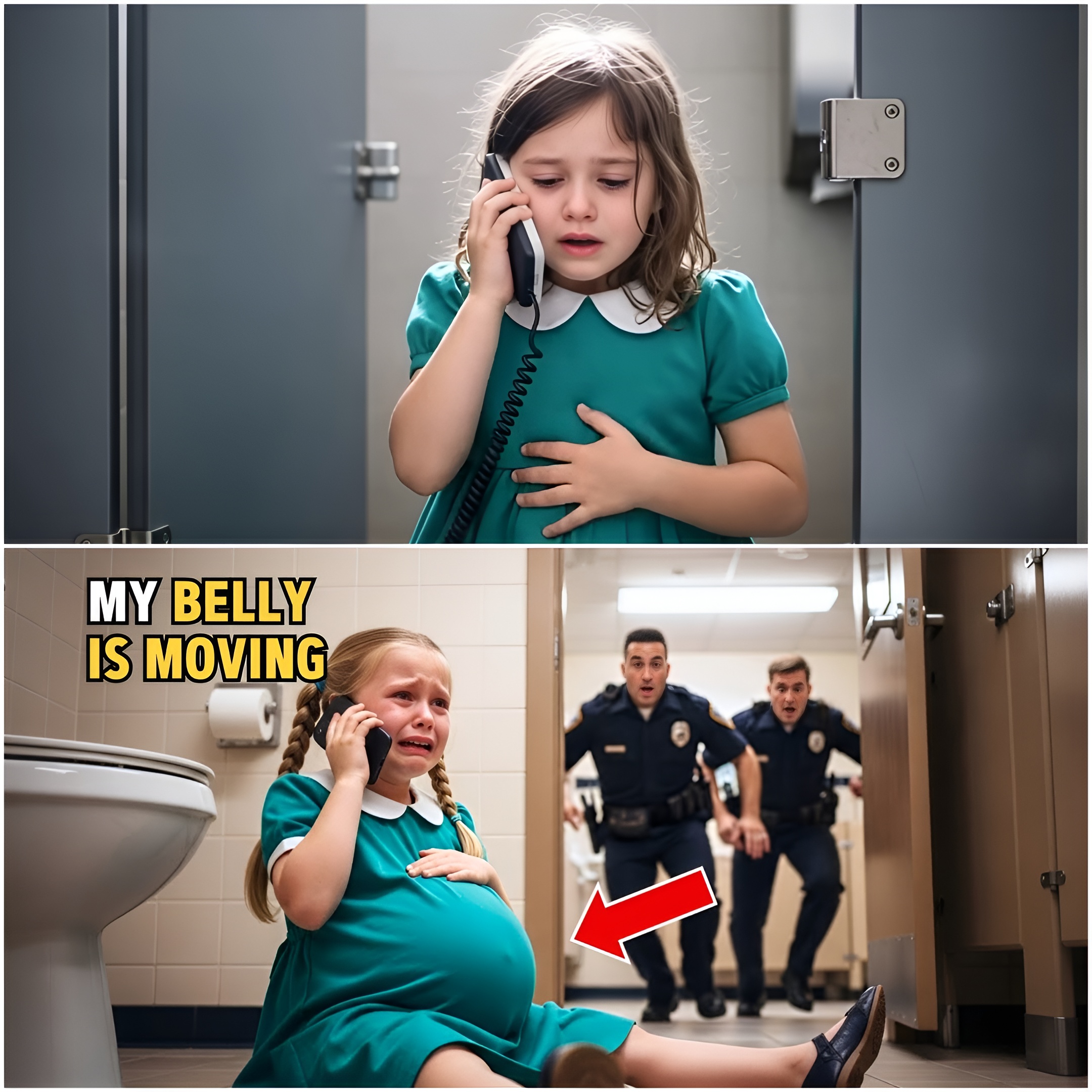The fluorescent light above the restroom at Rose Hill Elementary flickered erratically, casting long, dancing shadows across the tiled floor. It was just after lunch, and the distant hum of the cafeteria was a world away from the heavy silence in the farthest stall. There, 10-year-old Laya Monroe was curled on the cold toilet seat, her small arms wrapped tightly around a stomach that was unnaturally swollen and firm. Her breath came in shallow, panicked gasps as she stared at a crack in the floor, a jagged line that had become her only anchor in a reality that was slipping away.

Her fingers, trembling, hovered over the screen of a cheap, beat-up cell phone she’d found weeks ago and hidden away for an emergency. This was an emergency. She pressed the three numbers she had memorized: 9-1-1.
A calm, professional voice answered. “911, what’s your emergency?”
Laya’s lips barely moved, her voice a fragile whisper. “Something’s… something’s kicking in my stomach.”
A brief pause, then the dispatcher’s voice returned, slower and more deliberate. “Sweetheart, what’s your name? Can you tell me where you are?”
“Laya. Laya Monroe. I’m at Rose Hill School. Girls’ bathroom… near the cafeteria.” Her voice broke. A slow, sickening ripple moved under the thin fabric of her shirt, and she winced, a silent tear tracing a path through the grime on her cheek.
Twenty miles away, dispatcher Carla Reyes’s hands froze over her keyboard. For twelve years, she had taken thousands of calls, but the raw terror in this child’s whisper felt different—it was a chilling premonition of something deeply wrong. She hit the emergency override, flagging local units. “Laya,” she said gently, “can you unlock the stall door for me? Just slide the little latch open if you can.”
Laya looked at the rusted metal latch. Beyond the door, she could hear the normal sounds of school—laughter, a tray clattering to the floor. It felt like listening to a different planet. With a surge of courage, she reached out and clicked the latch open.
In the front office, Principal Marsha Dylan’s walkie-talkie crackled to life with the urgent call from dispatch. She was on her feet before the message finished, her heels striking the linoleum floor like a drumbeat as she and the school nurse, Susan Kirkland, rushed toward the cafeteria. When they entered the bathroom, they found Laya, pale and shivering, her eyes wide and glassy with fear.
Susan knelt beside her, her expression a mask of professional calm. “Hi, honey. You’re doing so well,” she said, her fingers finding the rapid, thready pulse at Laya’s wrist. Her gaze fell to the girl’s distended abdomen. It was tight and rigid, but then it twitched, a distinct, unsettling movement from within. Laya flinched.
“Did I do something bad?” she whispered, her voice filled with a guilt that no child should ever carry.
“No, sweetheart,” Susan said, her voice firm but kind. “You did something very brave.”
As paramedics arrived, the scene grew more urgent. Laya recoiled when they tried to move her, a fresh wave of panic washing over her. “No! Don’t take me! I didn’t do anything wrong!” she cried, her small body trembling violently.
It was Lieutenant Greg Hastings of the Missoula County Sheriff’s Department who finally broke through her fear. He had seen the worst of humanity, but the sight of this tiny, terrified child on a cold bathroom floor struck a nerve. He knelt down to her level. “You’re the police?” she asked.
“Yes, ma’am,” he said gently. “And you’ve done exactly the right thing.” As they lifted her onto a stretcher, her hand reached weakly for her backpack. “Toby,” she whispered. “My bear.” Greg spotted the one-eyed, threadbare stuffed animal, grabbed it, and placed it on her chest. Laya managed a tiny, grateful smile before her eyes rolled back and she passed out.
The real story, however, was just beginning to unravel in the back of the speeding ambulance. Laya drifted in and out of consciousness, her hands still protectively clutching her stomach. “It’s moving,” she murmured to Nurse Haley Brooks. “It hurts.”
Haley, a mother of two, had a gift for calming frightened children. But Laya’s fear was different. It was a deep, ingrained terror that went far beyond physical pain. As the ambulance took a sharp turn, Laya’s backpack slid to the floor, and a small, crumpled piece of paper tumbled out. Haley picked it up. It contained just two words, scrawled in a child’s handwriting: Don’t tell.
She tucked it into her pocket, her concern deepening. “Laya, do you feel sick to your stomach?” Haley asked gently.
“I ate something, I think,” Laya whispered, her voice cracking. “I didn’t know it wasn’t real food.”
Haley’s blood ran cold. “What did you eat, sweetheart?”
Laya hesitated, looking away. Her voice was barely a breath. “It had a cat on the can.” The words hung in the air, a horrifying confession. “Grandma said it was fine. She said if a cat could eat it, so could I… if I put milk on top.”
